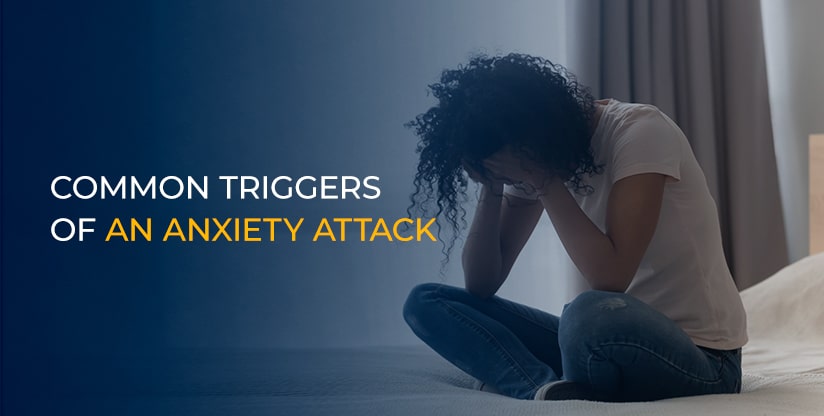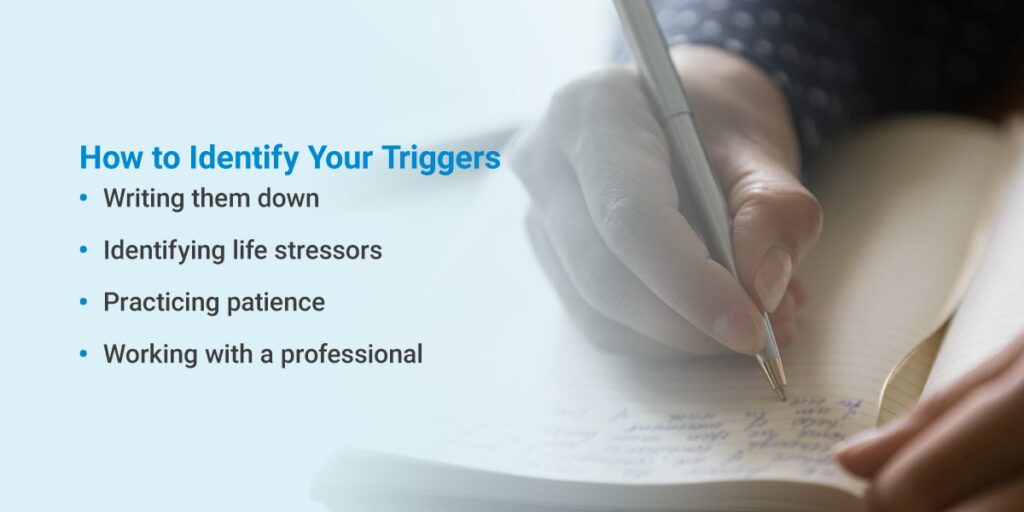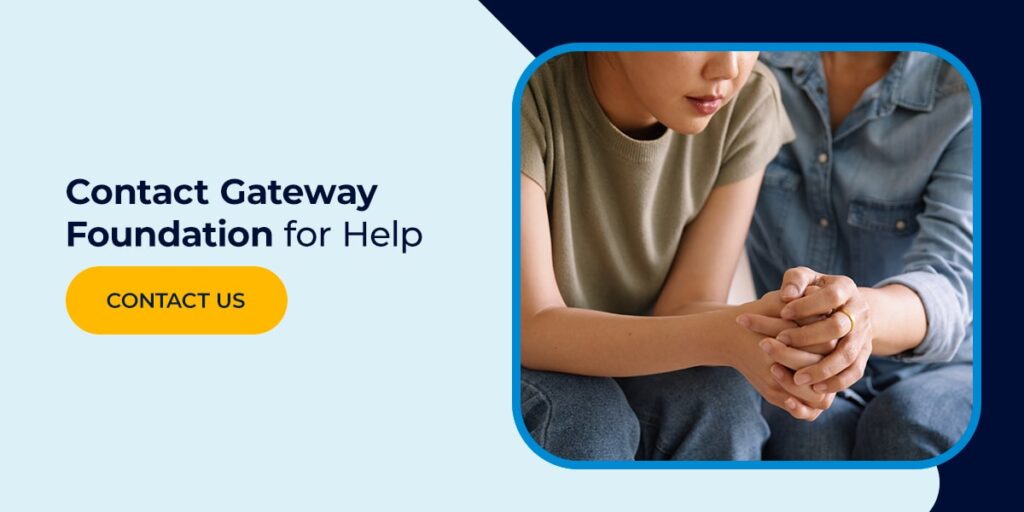- Feb 23
- AddictionMental Health Treatment

Do you experience anxiety attacks when life seems overwhelming? An anxiety attack describes an episode of excessive worrying and may include physical symptoms like increased heart rate and muscle tension. It can be a mentally and physically exhausting experience that requires recovery time.
If occasional anxiety keeps you up at night, you might try to avoid activities, people, places or things that make you feel nervous or worry too much. However, you likely want to face some anxiety triggers, like going to a job interview or taking an exam, so you can reach certain life goals. Luckily, there are many ways to keep anxiety in check during a stressful event or when facing a trigger. The first step is identifying your anxiety triggers, so you can learn how to cope.
What Are Triggers?
A trigger is something your brain has learned to perceive as dangerous. For example, the site of a car accident might be an anxiety trigger for an accident survivor because it reminds them of the traumatic event. Someone else might experience anxiety when they fight with a spouse because the conflict threatens their relationship or reminds them of communication styles seen in childhood. People have unique triggers based on past experiences and traumas — some triggers are easy to recognize, while others are less obvious.
When you encounter an anxiety trigger, whether a person, place, object, thought, emotion, or a combination of factors, your body reacts as if there’s danger nearby. This experience can lead to emotions like worry and fear and physical reactions such as muscle tension, increased heart rate, shortness of breath, and other uncomfortable symptoms.
Everyone has anxiety from time to time. However, you may have an anxiety disorder if anxiety feels uncontrollable and takes over your life. These disorders are very common, affecting an estimated 31% of adults at some point.
Common Triggers for Anxiety Attacks
There’s a decent chance you already know one or two of your triggers. Maybe you often have finances on your mind or can’t seem to stop worrying about a health issue. That said, some anxiety triggers aren’t as easy to identify, and you may not be aware that they’re worsening or triggering anxiety.
To help you identify the causes of your anxiety attacks, here are common triggers:
1. Caffeine
If anxiety worsens after your morning cup of coffee, you may want to cut back or start your day with decaf instead. Unfortunately, caffeine is a stimulant that can mimic anxiety symptoms, making someone feel nervous or jittery if consumed in large amounts.
People with a generalized anxiety disorder might find that even small amounts can worsen their anxiety. According to the Mayo Clinic, adults can have up to four cups of coffee daily without side effects. However, if you experience nervousness, increased heart rate, or irritability after any amount of caffeine, try decreasing your intake.
2. Negative Thinking
Do you tend to practice negative self-talk or often fear the worst will happen? This thinking can trigger anxiety, impact your mood and keep you from coping with stressors effectively.
Negative self-talk can be why someone develops or maintains anxiety, affirming a person’s fears or worries. Learning how to talk and positively think about yourself while taking care of your physical, mental, and emotional needs could help reduce anxiety levels.
Consider breaking negative thinking patterns by working with a therapist who offers cognitive behavioral therapy (CBT). CBT is an evidence-based approach to treating various mental health problems like anxiety disorders and depression. With CBT, your therapist will help you identify negative thoughts and beliefs and replace them with positive ones.
3. Stress
It’s no secret that stress can be a significant source of anxiety. Stressors like moving to a new house, going through a divorce, or coping with job loss can make someone worry day and night. Sometimes, everyday sources of stress, like traffic or chores, can trigger anxiety. While feeling anxiety during a stressful event or transition is normal, it shouldn’t take over your life.
If anxiety symptoms have gotten out of control due to stress, consider learning ways to relax and calm your mind. Techniques like breathing exercises and meditation are two ways to control stress and anxiety. It can also help to talk to professionals to solve stress-causing problems.
4. Health Issues
An upsetting diagnosis or worrisome physical symptoms can cause anxiety in anyone. To someone with an anxiety disorder, health-related issues can make them feel worse. They might worry about a medical test or think the worst about a recent diagnosis. Sometimes, health concerns can put a person’s life on hold.
If you’re spending a lot of time worrying about your health, talk to your family doctor and share your concerns. They can teach you more about your health and answer your questions, which may relieve some of the anxiety you’re experiencing. They can also investigate your symptoms and recommend ways to manage your physical and mental health.
5. Social Interactions
Many people experience anxiety before speaking in front of a group or going on a date. If you have a social event coming up and are experiencing anxiety symptoms, you might find relief once you settle into the situation or when the event is over.
However, about 7% of people have social anxiety disorder and experience extreme anxiety with everyday interactions. This disorder can interfere with a person’s life and keep them from going to work or school. If you think you might have a social anxiety disorder, know that there’s treatment available, including counseling, medication or a combination of both.
6. Medications
Certain medications can trigger or worsen anxiety. These include some asthma medications, prescription stimulants, thyroid medications and decongestants. If you suspect a prescription or over-the-counter medication causes you to feel anxious, speak to your doctor. They might recommend an alternative, decrease the dose or suggest coping strategies depending on your needs.
7. Substance Use
Both drugs and alcohol can lead to anxiety and panic attacks. For example, people who use methamphetamine commonly experience anxiety during intoxication and withdrawal. People often use substances to self-medicate and temporarily relieve symptoms of an anxiety disorder. Once the drug or alcohol wears off, anxiety symptoms come back, sometimes worse than before.
Using substances to relax can lead to addiction, which is known as a chronic disease. Like many other diseases, addiction is treatable with therapy, medication and support.
8. Sleep Problems
If worrisome thoughts keep running through your mind at night, you might not get your recommended eight hours of sleep. A lack of sleep can amplify daily stressors and worsen anxiety symptoms, making it even more challenging to get rest. Soon, you face a cycle of worrying and sleeplessness. Speaking to a doctor or therapist if you’re having trouble sleeping is essential.
9. Conflict
Fighting with a spouse, arguing with coworkers, or experiencing conflict can lead to anxiety or exacerbate symptoms. If you often feel overwhelmed by conflict, consider learning conflict resolution techniques. A counselor can also teach you healthy ways to cope with intense feelings resulting from conflict so you feel less anxious.
10. Poor Nutrition
Foods rich in nutritional value support your body — and your mind. Just a few minor changes could make all the difference in your mental health journey, such as:
- Eating regularly: Skipping meals could lead to low blood sugar, which causes various physical symptoms and could trigger anxiety.
- Avoiding overeating: Eating when you are full can cause fatigue or sluggish feelings. Some side effects, like heartburn and stomach pain, could also trigger anxious feelings.
- Prioritizing nutrition: Nutritiously balanced meals help regulate blood pressure and set you up for a good night’s sleep, giving you the support you need to combat triggers.
11. Financial Challenges
Bills, debt, wages, and expenses can trigger anxiety in many people, especially those facing hardship. Budgeting or seeking professional help from an accountant or financial advisor can help you develop a plan of action.
12. Not Prioritizing Your Needs
Neglecting your physical, mental, and emotional needs can spiral into feelings of hopelessness and overwhelm, which stress your body and mind and trigger an anxious response. Consider asking a friend to help keep you accountable by encouraging regular self-care and reflection.
13. Environmental Pressures
Your environment can significantly impact your well-being. Examples of everyday environmental stressors include:
- Physical mess, such as a cluttered home or room
- A heavy workload or working in a high-pressure position
- Upcoming projects or school exams
- Caring for other people or pets
- Feeling pressured to meet a set of standards
14. Personal Traumas
Most people feel anxious when something reminds them of a bad memory or traumatic event from their past. Specific triggers vary from person to person, as everyone’s experience differs. Some things that could bring up unpleasant feelings include:
- Sounds
- Places
- Smells
- Sights
- People
- Events
- Dates
Some personal traumas may also develop into post-traumatic stress disorder (PTSD) or phobias.

How to Identify Your Triggers
Identifying what triggers your anxiety makes preventing attacks and managing symptoms easier. Consider:
- Writing them down: Noting your feelings throughout the day or after moments of intense anxiety can help you identify personal triggers, which can make it easier to develop coping strategies. Write down what you did when the feelings arose and what specific symptoms you felt.
- Identifying life stressors: Identify the major stressors in your life, such as your work, relationships, pregnancy, or finances. This gives you an idea of where to start making helpful changes.
- Practicing patience: Anxiety can cause negative self-thoughts and poor self-image, making identifying your triggers challenging because of the anxious reaction. Be patient with yourself and explore events in your past to determine how they may affect you today.
- Working with a professional: If you’re having trouble identifying your triggers, speaking with a professional can make it easier. A therapist or counselor can give you insight while helping you develop coping tools.
Tips for Preventing and Managing Anxiety Attacks
Here are tips to help you feel at ease whether you encounter an unexpected trigger or cope with anxiety every day:
- Aim to get 30 minutes of exercise every day to feel less stressed.
- Find a safe, calming place to reset.
- Practice deep breathing and mindfulness techniques to help you focus on the present.
- Develop and stick to a daily routine to minimize uncertainty.
- Reduce caffeine intake.
- Prioritize getting enough sleep.
- Eat a healthy, balanced diet.
- Practice positive self-talk and self-compassion.
- Let yourself laugh.
- Focus on things you can control and let go of anything you can’t.
- Talk to a friend, family member, or therapist when overwhelmed.
- Work with a counselor to learn effective coping strategies and treat underlying conditions.

Contact Gateway Foundation for Help
At Gateway Foundation, our compassionate, skilled therapists can treat any type of anxiety disorder and help you gain control of your life. Even if you just need someone to help you through a difficult time, we can do that, too. A professional will consider your unique needs and goals and develop a tailored treatment plan incorporating evidence-based techniques.
Whether you need an outpatient treatment program to suit a busy schedule or are interested in residential treatment, we’re here to help. Contact us today to learn more about anxiety treatment and how to get started.


